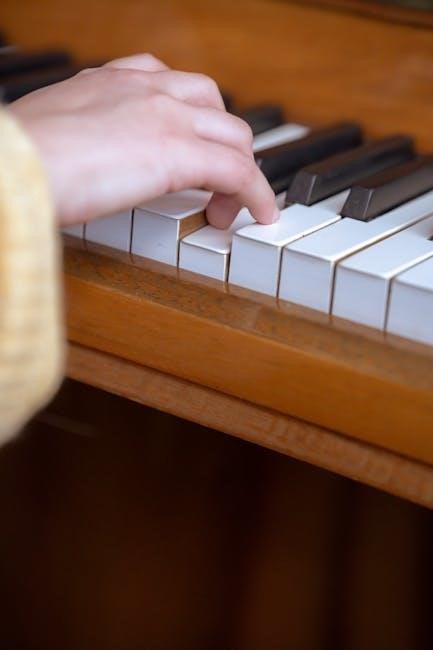August Wilson’s Pulitzer Prize-winning play‚ set in Pittsburgh’s Hill District‚ explores themes of family legacy‚ cultural identity‚ and freedom‚ available as a downloadable PDF for study and analysis․
Brief Overview of the Play
August Wilson’s “The Piano Lesson” is a powerful drama set in Pittsburgh’s Hill District during the 1930s․ The story revolves around the Charles family and their ancestral piano‚ carved with African patterns‚ which holds deep historical and emotional significance․ Boy Willie‚ a determined and ambitious brother‚ arrives from Mississippi with plans to sell the piano to buy land once worked by their enslaved ancestors․ His sister Berniece‚ however‚ fiercely opposes the sale‚ seeing the piano as a vital connection to their heritage․ The play explores themes of family legacy‚ cultural identity‚ and the struggle for freedom‚ blending elements of history‚ spirituality‚ and personal conflict․ Through its rich dialogue and complex characters‚ “The Piano Lesson” captures the essence of African American experiences and the weight of the past in shaping the present․
Historical Context of the Play
Set in Pittsburgh’s Hill District during the 1930s‚ “The Piano Lesson” is deeply rooted in the historical experiences of African Americans during the Great Migration․ The play reflects the broader societal shifts of the time‚ including the struggle for economic independence and cultural preservation․ August Wilson draws on the legacy of slavery and racism‚ using the piano as a symbol of the family’s history and resilience․ The story explores the tension between holding onto the past and embracing the future‚ a common theme for African Americans navigating the aftermath of slavery and segregation․ By setting the play in this specific time and place‚ Wilson highlights the enduring impact of historical events on individual and collective identity․ The piano itself becomes a testament to the horrors of slavery and the strength of ancestral heritage‚ making the play a powerful exploration of African American history and culture․
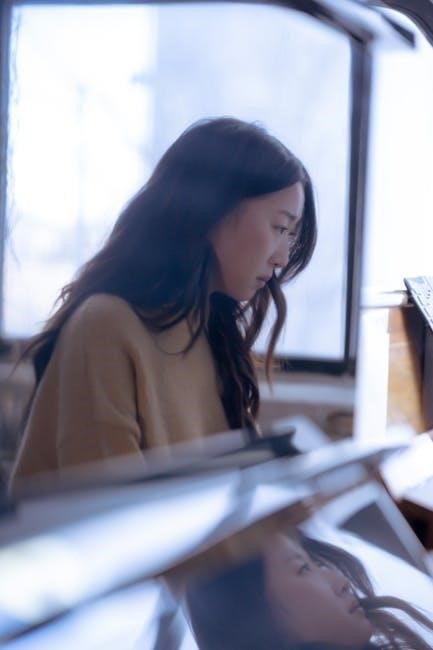
Plot Summary of “The Piano Lesson”
The play centers on siblings Boy Willie and Berniece disputing a family heirloom—a piano carved with ancestral figures—exploring themes of heritage‚ freedom‚ and the supernatural․
Setting of the Play
The Piano Lesson is set in Pittsburgh’s Hill District in 1936‚ focusing on the Charles family home․ This setting mirrors August Wilson’s own experiences growing up in Pittsburgh․ The time period reflects the post-slavery era‚ where African Americans sought freedom and identity․ The home serves as a symbol of resilience and history․ The piano‚ a central object‚ ties the family to their enslaved ancestors․ The setting emphasizes the struggle between preserving heritage and seeking economic independence․ This backdrop allows Wilson to explore themes of legacy‚ family‚ and cultural identity․ The Hill District’s vibrant community life is subtly portrayed‚ highlighting the tensions of urban migration and the quest for a better future․ The setting is crucial in grounding the play’s emotional and historical depth․
Main Characters in the Play
The Piano Lesson revolves around a core group of characters‚ each embodying distinct perspectives on heritage and identity․ Berniece Charles‚ the strong-willed sister‚ fiercely protects the family piano‚ seeing it as a connection to their enslaved ancestors․ Her brother‚ Boy Willie‚ represents a contrasting view‚ seeking to sell the piano to buy land‚ symbolizing economic freedom․ Doaker Charles‚ their uncle‚ serves as a voice of wisdom and family history․ Other key figures include Maretha‚ Berniece’s daughter‚ whose presence underscores the legacy’s future; Avery‚ a preacher and suitor to Berniece‚ offering a path to spiritual and emotional healing; and Lymon‚ Boy Willie’s friend‚ whose humor and simplicity highlight the characters’ shared struggles․ These characters drive the play’s emotional depth and thematic exploration of freedom‚ identity‚ and family bonds․
Central Conflict of the Play
The central conflict in The Piano Lesson arises over the fate of the family heirloom piano‚ carved with ancestral stories‚ which becomes a symbol of cultural heritage and identity․ Boy Willie‚ determined to sell the piano to purchase the land his ancestors once worked as slaves‚ clashes with his sister Berniece‚ who fiercely opposes the sale‚ viewing the piano as a sacred connection to their family’s history․ This conflict extends beyond economic gain‚ representing a deeper struggle between preserving the past and embracing the future․ The piano embodies the weight of their lineage‚ with each sibling holding opposing beliefs about its value and purpose․ This tension drives the emotional core of the play‚ exploring themes of freedom‚ identity‚ and the legacy of slavery․
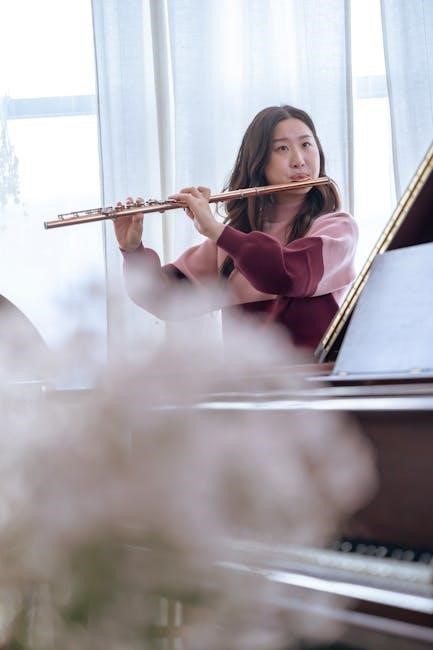
Themes and Symbolism in “The Piano Lesson”
The play explores themes of family heritage‚ freedom‚ and identity through the symbolic piano‚ which represents the past and cultural legacy of the Charles family․
The Family Heirloom: The Piano
The piano serves as a central symbol‚ representing the family’s history and cultural heritage․ Carved with ancestral stories‚ it embodies the legacy of slavery and freedom‚ becoming a source of conflict between the characters who view it as both a valuable object and a sacred family treasure․
The Significance of the Land
The land holds profound emotional and historical significance in The Piano Lesson․ Boy Willie’s desire to purchase the land once worked by his enslaved ancestors symbolizes a quest for freedom and identity․ The land represents a connection to the past while offering hope for a future free from oppression․ It embodies the struggle for Black Americans to reclaim their heritage and establish a sense of belonging․ August Wilson uses the land to explore themes of legacy‚ sacrifice‚ and the enduring impact of slavery on African American families․ The land becomes a symbol of liberation and self-determination‚ contrasting with the piano’s role as a reminder of the family’s painful history․ Through this‚ Wilson highlights the tension between preserving the past and building a future․
Freedom and Identity
Freedom and identity are central themes in The Piano Lesson‚ as August Wilson explores the complexities of Black lineage․ The piano‚ carved with ancestral stories‚ symbolizes cultural heritage‚ while the land represents a chance to reclaim history․ Boy Willie and Berniece embody the struggle between embracing the past and forging a new future․ Their conflict over the piano and the land reflects broader societal tensions․ The play highlights the importance of self-determination and the challenges of navigating a world shaped by slavery’s legacy․ Through its characters‚ Wilson illustrates the enduring quest for identity and freedom‚ showing how these elements are intertwined in the African American experience․ The play serves as a powerful commentary on the journey toward liberation and the importance of preserving one’s heritage in the face of oppression․
The Supernatural Elements
The supernatural elements in The Piano Lesson add a layer of mystery and depth to the story․ The ghost of Sutter‚ a former slave owner‚ haunts the Charles family‚ symbolizing the lingering presence of the past․ The piano‚ carved with ancestral stories‚ is often seen as a vessel for these spirits‚ embodying both the family’s history and its cursed legacy; Boy Willie’s decision to sell the piano is driven by a desire to break free from this haunting‚ while Berniece sees it as a connection to their ancestors․ The supernatural elements underscore the play’s exploration of identity‚ freedom‚ and the unresolved wounds of slavery․ Through these eerie and symbolic moments‚ Wilson highlights the interconnectedness of the past and present‚ reminding audiences that the ghosts of history cannot be easily escaped․ These elements enrich the narrative‚ making the play a powerful exploration of cultural and familial legacy․
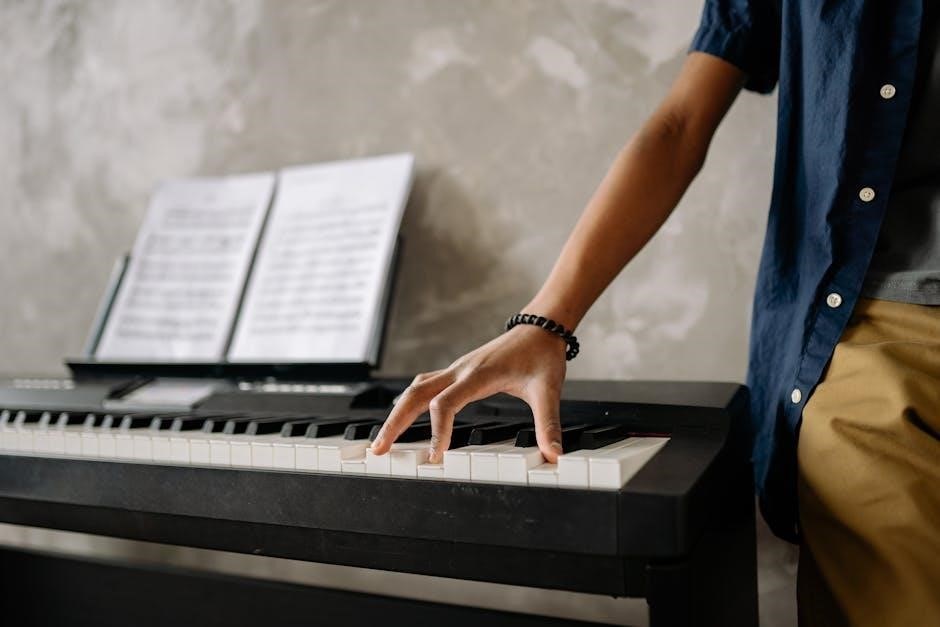
The Play’s Success and Legacy
The Piano Lesson earned widespread acclaim‚ winning the Pulitzer Prize and Tony Awards‚ solidifying its place as a landmark of American theater‚ celebrated for its profound storytelling and cultural significance․
Pulitzer Prize for Drama

August Wilson’s The Piano Lesson won the Pulitzer Prize for Drama in 1990‚ a milestone recognizing its profound exploration of family legacy and cultural identity․ The play’s nuanced storytelling‚ centered around a family heirloom piano carved with ancestral histories‚ captivated audiences and critics alike․ This award solidified Wilson’s reputation as a master playwright‚ emphasizing the play’s themes of freedom‚ identity‚ and the weight of history․ The Pulitzer Prize not only acknowledged the play’s artistic excellence but also its contribution to the broader narrative of Black American experiences․ As part of Wilson’s Pittsburgh Cycle‚ The Piano Lesson continues to resonate‚ offering a powerful reflection on heritage and resilience․ Its success endures‚ making it a cornerstone of American theater and a testament to Wilson’s enduring legacy․ The play’s recognition underscores its timeless relevance and emotional depth․
Tony Awards and Nominations
August Wilson’s The Piano Lesson garnered significant acclaim during its Broadway run‚ earning five Tony Award nominations and winning the prestigious award for Best Play․ This recognition highlighted the play’s compelling narrative and its impact on the theatrical landscape․ The production’s success was further underscored by its emotional depth and the strong performances of its cast‚ which brought Wilson’s complex characters to life․ The Tony Awards acknowledgment solidified the play’s place as a landmark work in American theater‚ celebrating its exploration of family legacy‚ identity‚ and freedom․ The play’s achievement at the Tony Awards‚ alongside its Pulitzer Prize win‚ cemented its status as a masterpiece of contemporary drama․ Its enduring relevance continues to inspire new adaptations and productions‚ ensuring its legacy endures for future generations of theater enthusiasts and scholars alike․
Cultural Impact and Recognition
August Wilson’s The Piano Lesson has left an indelible mark on American culture‚ resonating deeply with audiences and scholars alike․ Its exploration of themes such as family legacy‚ identity‚ and freedom has made it a cornerstone of African American literary and theatrical history․ The play’s ability to weave historical narratives with contemporary issues has fostered important conversations about race and heritage․ Its influence extends beyond the stage‚ inspiring adaptations and discussions that continue to enrich cultural dialogue․ The availability of The Piano Lesson as a PDF has further amplified its reach‚ allowing students and enthusiasts to engage with Wilson’s work in new ways․ This widespread accessibility has ensured that the play’s cultural significance endures‚ making it a vital text for understanding the African American experience and its contribution to the broader American story․
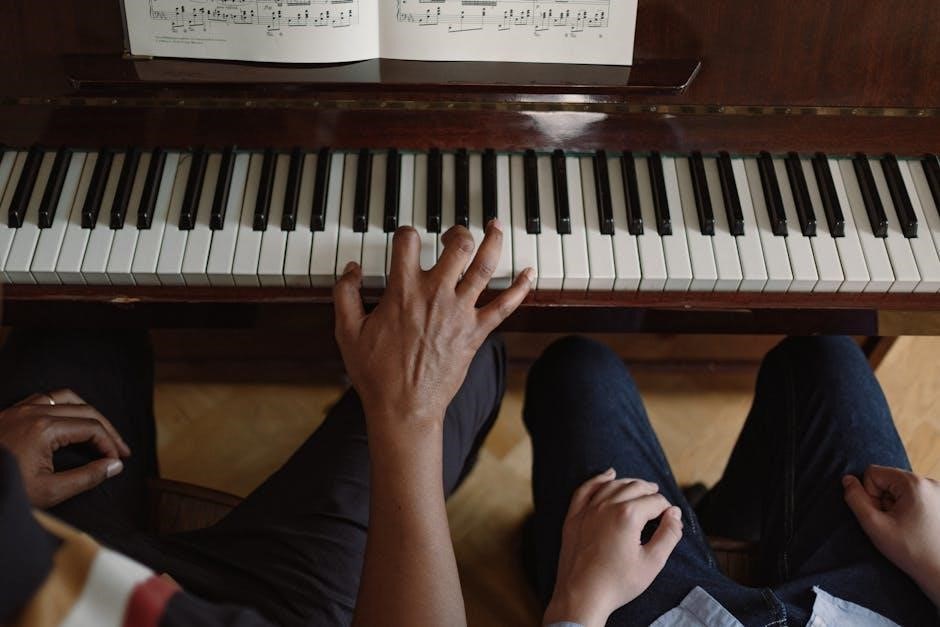
Adaptations of “The Piano Lesson”
The play has been adapted into a Broadway production and a feature-length film‚ both capturing its emotional depth and cultural significance‚ expanding its reach to wider audiences․
Broadway Production
The Broadway production of The Piano Lesson premiered in 2022‚ directed by Malcolm Washington‚ featuring John David Washington‚ Danielle Deadwyler‚ and Samuel L․ Jackson․ Set in Pittsburgh’s Hill District in 1936‚ the play revolves around the Charles family’s ancestral piano‚ a symbol of their history and legacy․ The production ran at the James Earl Jones Theatre‚ breaking box office records and receiving widespread critical acclaim․ It highlighted the emotional depth and cultural significance of August Wilson’s work‚ showcasing the complex dynamics between characters like Boy Willie and Berniece․ The Broadway adaptation stayed true to the original play’s themes of family‚ identity‚ and freedom‚ further cementing its place in American theater history․ This production underscored the enduring relevance of Wilson’s storytelling and its ability to resonate with modern audiences․
Feature-Length Film Adaptation
Malcolm Washington’s directorial debut‚ The Piano Lesson‚ is a feature-length adaptation of August Wilson’s play‚ starring John David Washington and Danielle Deadwyler․ The film follows Boy Willie’s journey to Pittsburgh‚ where he aims to sell the ancestral piano to purchase land once worked by his enslaved ancestors․ This adaptation captures the emotional weight of the play‚ exploring themes of lineage‚ freedom‚ and identity․ Available in PDF format‚ the screenplay offers insights into Wilson’s narrative strategies‚ showcasing his storytelling techniques․ The film has been praised for its faithful interpretation of the original work‚ bringing the Charles family’s story to a new audience while maintaining the integrity of Wilson’s vision․ This adaptation highlights the universality of the play’s themes and its enduring relevance in contemporary culture․

August Wilson and His Work
August Wilson‚ a renowned playwright‚ crafted The Piano Lesson as part of his Pittsburgh Cycle‚ exploring themes of African American heritage and identity through powerful narratives․
Biography of August Wilson
August Wilson‚ born Frederick August Kittel Jr․ on April 27‚ 1945‚ in Pittsburgh‚ Pennsylvania‚ was a celebrated American playwright and Pulitzer Prize winner․ His early life in Pittsburgh’s Hill District deeply influenced his work‚ which often explored the African American experience․ Wilson began writing in his late teens‚ eventually co-founding the Black Horizons Theater in Pittsburgh․ His play Fences earned him his first Pulitzer Prize in 1987‚ followed by The Piano Lesson in 1990․ Wilson’s Pittsburgh Cycle‚ a series of ten plays chronicling the African American experience decade by decade‚ cemented his legacy․ He passed away on October 2‚ 2005‚ leaving a profound impact on American theater and literature․ His works remain widely studied‚ including The Piano Lesson‚ available as a PDF for educational purposes․
The Pittsburgh Cycle and Its Significance
August Wilson’s Pittsburgh Cycle is a groundbreaking series of ten plays‚ each set in a different decade of the 20th century‚ chronicling the African American experience․ The cycle captures the social‚ cultural‚ and historical journey of Black Americans‚ with each play offering a unique perspective on identity‚ family‚ and resilience․ Set in Pittsburgh’s Hill District‚ the plays reflect the vibrant yet challenging lives of the community․ The Pittsburgh Cycle is celebrated for its depth and authenticity‚ providing a powerful narrative of African American life․ Wilson’s work‚ including The Piano Lesson‚ is widely studied and admired‚ with the play available as a PDF for educational purposes‚ allowing readers to explore its themes and significance in detail․

Narrative Structure and Style
August Wilson’s The Piano Lesson features a non-linear narrative‚ blending storytelling techniques with rich dialogue․ The play’s structure emphasizes emotional depth and cultural heritage‚ creating a vivid exploration of family history and identity through its poetic and layered storytelling style․
Storytelling Techniques
August Wilson’s The Piano Lesson employs a rich tapestry of storytelling techniques to convey its themes․ The play’s non-linear narrative seamlessly weaves past and present‚ using flashbacks and ancestral memories to highlight the piano’s historical significance․ Wilson incorporates supernatural elements‚ such as the ghost of Sutter‚ to underscore the family’s haunted legacy․ Dialogue is layered with emotional depth‚ revealing characters’ inner conflicts and generational struggles․ The piano itself serves as a storytelling device‚ its carvings symbolizing the family’s history and cultural identity․ Through these techniques‚ Wilson creates a powerful exploration of heritage‚ freedom‚ and the weight of history‚ drawing audiences into the Charles family’s complex journey․ The play’s structure and dialogue emphasize the interconnectedness of personal and collective narratives‚ showcasing Wilson’s mastery of dramatic storytelling․ This approach ensures the play’s emotional resonance and thematic depth remain unforgettable․
Dialogue and Character Development
August Wilson’s The Piano Lesson masterfully uses dialogue to reveal the complexities of its characters․ Conversations between Boy Willie and Berniece expose their conflicting views on heritage and survival‚ highlighting their emotional depth․ Boy Willie’s assertive tone reflects his determination to claim the piano‚ while Berniece’s resistance reveals her deep connection to the family’s past․ The dialogue also underscores the generational divide‚ with Boy Willie representing a desire for progress and Berniece embodying the preservation of history․ Through their exchanges‚ Wilson explores themes of identity‚ freedom‚ and the weight of legacy․ The supernatural presence of Sutter’s ghost further enriches the dialogue‚ adding layers of tension and historical resonance․ Wilson’s ability to craft authentic‚ emotionally charged conversations makes the characters relatable and their struggles deeply human‚ ensuring the play’s enduring impact on audiences․ The dialogue-driven narrative remains a cornerstone of the play’s dramatic power․
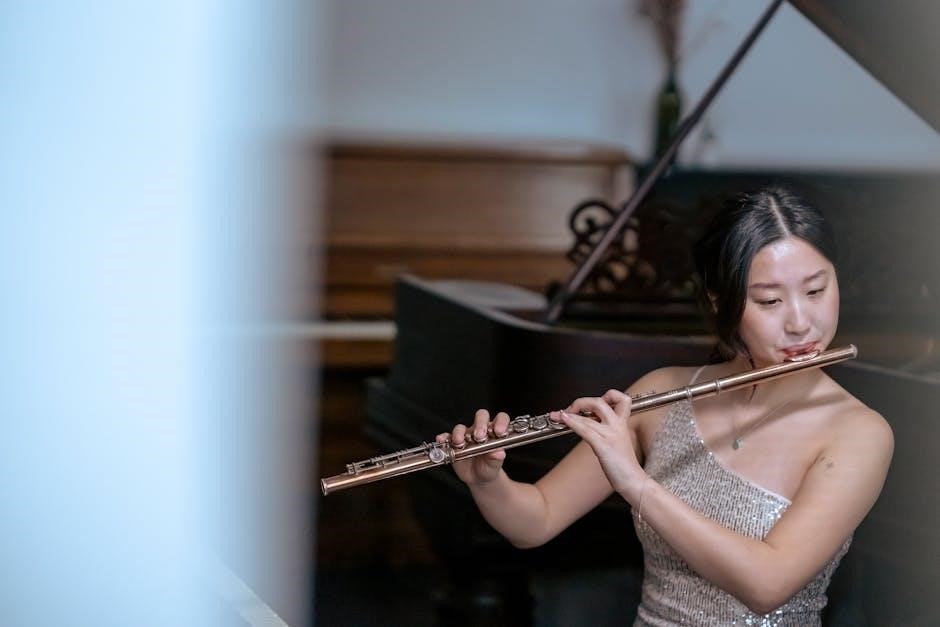
The Piano Lesson play PDF offers the full script‚ study guides‚ and analysis‚ providing easy access to August Wilson’s masterpiece for educational and personal reading purposes․
Availability and Accessibility

The Piano Lesson play PDF is widely available for download online‚ offering readers easy access to August Wilson’s masterpiece․ Platforms like educational websites‚ libraries‚ and e-bookstores provide the script‚ making it accessible for study and personal reading․ The PDF format ensures compatibility across devices‚ allowing users to engage with the play anytime and anywhere․ Additionally‚ study guides and analysis are often included‚ enhancing understanding of the play’s themes‚ characters‚ and historical context․ This accessibility has made The Piano Lesson a popular choice for students‚ educators‚ and theatre enthusiasts worldwide‚ fostering deeper appreciation for Wilson’s work and its cultural significance․ The convenience of digital access has also contributed to the play’s enduring legacy‚ ensuring its relevance for future generations․
Downloading the Play Script
The Piano Lesson play script in PDF format is readily available for download from various online sources‚ including educational websites‚ libraries‚ and e-bookstores․ Many platforms offer free access to the play‚ while others may require a nominal fee․ The PDF version ensures that the script is easily readable on multiple devices‚ such as computers‚ tablets‚ and smartphones․ Additionally‚ some downloads include study guides or analysis to enhance understanding of the play’s themes and characters․ This accessibility makes it convenient for students‚ educators‚ and theatre enthusiasts to explore August Wilson’s work․ The PDF format also preserves the original structure and formatting of the play‚ ensuring an authentic reading experience․ With just a few clicks‚ users can access and download the script‚ making it a popular choice for both academic and personal use․ This ease of access has helped maintain the play’s relevance and popularity․
Study Guides and Analysis
Study guides and analyses for The Piano Lesson play are widely available online‚ offering in-depth insights into August Wilson’s work․ These resources provide detailed breakdowns of themes‚ characters‚ and historical context‚ making them invaluable for students and educators; Many guides include summaries of key scenes‚ character motivations‚ and symbolic elements‚ such as the piano itself․ Analysis sections often explore the play’s exploration of freedom‚ identity‚ and the legacy of slavery․ Additionally‚ some guides offer discussion questions and essay prompts to facilitate deeper understanding․ These materials are particularly useful for those studying the play in academic settings or preparing for productions․ By examining the play through these lenses‚ readers can gain a richer appreciation of Wilson’s masterful storytelling and its cultural significance․ The guides complement the PDF version of the play‚ enhancing the learning experience for all who engage with the text․
